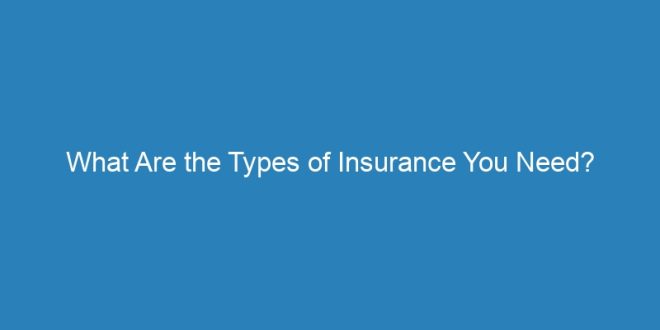Insurance offers security against the unexpected. You will find a guideline to hide almost anything, but some are more important than others. It all depends on your needs.
When planning your future, these four types of insurance should be kept in mind.
1. Car insurance
Car insurance is vital when driving a car. Not only is it compulsory in most states, car accidents are expensive. According to 2019 data, a car accident could cost you a pretty high $ 12,000 even without injuries; it costs a good deal $ 1.7 million if an accident is fatal.1 These costs include medical expenses, vehicle damage, lost wages and productivity, and more.
Most states simply require that you have basic auto insurance. This covers legal fees, personal injury or death, and property damage to others once you are legally responsible. Some states also require you to have Personal Injury Protection (PIP) and / or uninsured motorists cover. These covers cover medical costs related to the incident for you and your passengers, regardless of who is at fault. This also helps cover hit-and-run accidents and accidents with uninsured drivers
2. Home insurance
For many people, a house is their greatest asset. Household contents insurance protects you by offering you a financial safety net in the event of damage. If you have a mortgage, your lender will likely need a policy. But if you aren’t buying your own lender, your lender can buy it for you and send you the bill. This can be done at better cost and with less coverage.
Home insurance can be a good idea even after you’ve paid off your mortgage. It protects you from the cost of property damage. It also protects you from liability for personal injury and property damage to guests caused by you, your family, or your pets.
It can also cover you if your home becomes uninhabitable after an insured loss. And it’s worth repairing or rebuilding freestanding buildings like your fence or shed that have been damaged by insured damage
3. Insurance
Health insurance is one of the main types. Your health enables you to calculate, make money and enjoy life. What if you develop a serious illness or have an accident without being insured? You may not be able to receive treatment or you may have to pay huge medical bills. A study published in the American Journal of Public Health found that nearly 67% of people thought their medical expenses were a cause of their bankruptcy
“Buying insurance is an integral part of managing significant personal financial risk,” said Harry Stout, author of Private Finance and former president and CEO of an insurance company. Stout told The Balance in an email: “Not being insured is often financially devastating because of the high healthcare costs for households.”
Health plans purchased through the marketplace may even include preventive services like vaccines, checkups, and some exams. This is how you maintain your health and well-being to meet the demands of life.
4. Life insurance
Many experts say that life insurance should be a central part of your budget. But how important is it really? The answer: it depends on you.
“The need for insurance forever varies and changes over time,” said Stephen Caplan, CSLP ™, financial advisor at Neponset Valley Financial Partners, in an email to The Balance. “When someone is young and single, their needs are minimal. If they are responsible for the upkeep of a family, it is crucial to provide adequate protection. “
What direct financial costs would your family have after your death? believe that outstanding debts, funeral expenses, etc.
How long would it take your next of kin to support if you gave up the ghost today?
In addition to meeting your family’s most urgent needs, would you give away money for important but less urgent expenses? Think about your children’s education or legacy, donations to charities, etc.
You may also want social security
“Contrary to what many of us think, your home or car is not your greatest asset. Rather, it is their ability to generate income. Yet many professionals do not insure the prospect of disability, ”John Barnes, CFP and My Family life insurance owner, said in an email to The Balance.
He continued, “Disability is more common than people think.” The Social Security Administration estimates that one in four 20-year-olds will develop a disability before they reach retirement age.9 “Disability insurance is the only insurance that pays you benefits when you are sick or injured and unable to go to work.”
It is true that you only have disability benefits through employee compensation for injuries that occur while you are at work. Still, Barnes warns that the employee’s contract of employment “does not cover injuries or illnesses outside of the workplace such as cancer, diabetes, MS or maybe COVID-19”.
The good news is that Social Security is unlikely to break the bank; it often fits in most budgets. “Typically, social security premiums are two cents for every dollar you make,” Barnes said. “Of course, the premiums for supported age, occupation, salary and state of health vary.” If you’re making $ 40,000 a year, that’s $ 800 a year (about $ 67 a month).
It depends on
“Insurance plays a crucial but simple role: it compensates for the economic damage in the event of a disaster,” says Caplan.
Auto, property, health, disability and life insurance are the top types of insurance that will help you protect yourself and your belongings. But you also have to believe your needs. Talk to licensed agents to find out the easiest way for this policy to work for you.
Financial planners can advise you on other popular types of insurance that should even be part of your budget.
 KRETENG.COM Website Review Bisnis, Tempat dan Harga Produk Terbaik di Indonesia
KRETENG.COM Website Review Bisnis, Tempat dan Harga Produk Terbaik di Indonesia

